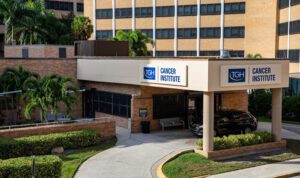Tampa General Hospital (TGH) recently announced the opening of a new outpatient Cellular-Immunotherapy Transplant Unit (CTU) at the TGH Cancer Institute to offer alternative cell therapy treatment to patients with aggressive blood cancers such as leukemias, lymphomas, multiple myeloma and other cancers.
The program allows adult patients undergoing Chimeric Antigen Receptor (CAR) T-cell therapy and Bone Marrow Transplant (BMT) to receive daily treatment at the new unit as an outpatient while living at home with a 24/7 caregiver to monitor the patient, take vitals and communicate regularly with TGH clinicians on the patient’s behalf. To qualify for the outpatient treatment program, patients and their caregivers must meet specific medical criteria, live within a 60-minute radius of the hospital and complete a mandatory educational course.
 “The establishment of the new Cellular-Immunotherapy Transplant Unit at the TGH Cancer Institute represents a major milestone in our endeavor to remain at the forefront of innovative treatments for patients with complex cancers,” said Dr. Eduardo Sotomayor, vice president and executive director of the TGH Cancer Institute. “Through this latest advancement, patients can receive cell therapy treatment at Tampa General on an outpatient instead of inpatient basis.”
“The establishment of the new Cellular-Immunotherapy Transplant Unit at the TGH Cancer Institute represents a major milestone in our endeavor to remain at the forefront of innovative treatments for patients with complex cancers,” said Dr. Eduardo Sotomayor, vice president and executive director of the TGH Cancer Institute. “Through this latest advancement, patients can receive cell therapy treatment at Tampa General on an outpatient instead of inpatient basis.”
CAR T-cell therapy is an immunological treatment that uses the body’s own immune T cells to find and kill cancer cells. BMT, also known as stem cell therapy (SCT), is a proven treatment for patients with blood cancers who have a high risk of relapsing after traditional therapies.
The CTU is led by Dr. Ivan Borrello, a world-renowned specialist in multiple myeloma and director of the Multiple Myeloma, Bone Marrow Transplant and Cell Therapies program at Tampa General, along with a team of dedicated cell therapy nurses, practitioners and social workers. Borrello joined the TGH Cancer Institute in 2022 from the Johns Hopkins Sidney Kimmel Comprehensive Cancer Center in Baltimore, where he established a novel translational cell therapy program.
“Shifting to an outpatient setting for patients receiving cell therapy can have several benefits, including that the majority of patients prefer the comforts of living at home, are more physically active and have better nutrition,” Borrello said. “Living at home with the support of loved ones and trusted caregivers enables patients to live a fuller life each day and their condition tends to improve more quickly and experience less depression and anxiety. Furthermore, some studies even suggest better overall transplant outcomes when performed in the outpatient setting.”
In a 2021, systematic review of 29 comparative studies published by PLOS, a nonprofit, open-access publisher for researchers demonstrated that the outpatient model in its different forms has several benefits for health care organizations and patients. When looking at safety and effectiveness, the outpatient option scores higher in both autologous (using the patient’s own stem cells) and in allogeneic (stem cells collected from a donor) cases. Numerous studies show the frequency of complications to be lower in patients receiving outpatient treatment. Patients who can be in their own home after visiting the outpatient clinic have better nutrition which has been associated with lower probability of side effects.
CTU patients are thoroughly evaluated by the care team to determine if outpatient cell therapy is the best treatment option. “While we monitor our CTU patients closely, caregivers play an integral role in the patient’s treatment and recovery,” said Jennifer Hanle, MSN, AGPCNP-BC, lead nurse practitioner of the CTU. Hanle also joined the TGH Cancer Institute in 2022 from the Johns Hopkins Sidney Kimmel Comprehensive Cancer Center in Baltimore.
Patients receiving cell therapy are typically hospitalized for about three weeks. Cell therapy outpatients visit the clinic daily to receive the same type of treatment and monitoring they would receive in the hospital. The CTU team includes physicians and nurses who specialize in the care of cell therapy patients. If a patient’s condition changes, the patient can be quickly admitted to the hospital.
The TGH Cancer Institute Cell Therapy Unit offers patients beds or recliners for their comfort during treatment. “Nurses and physicians have the same expertise and training in cell therapy as the inpatient team. Patients receive clinically excellent care and many of our caregivers work in both locations,” said Jennifer Feeley, nurse manager for Tampa General’s inpatient cell therapy unit.
In 2022, the TGH Cancer Institute opened a state-of-the-art Bone Marrow Transplant (BMT) and Cell Therapies unit to treat patients with aggressive blood cancers, such as leukemias, lymphomas, multiple myeloma and other types of cancer. In 2023, the Institute began its CAR T treatment program for patients with aggressive forms of B-cell non-Hodgkin lymphomas and more.
“Tampa General has made significant enhancements in cell therapy cancer treatments and advanced immunotherapy options over the past several years,” said Dr. Abraham Schwarzberg, EVP, chief of Oncology, president of the Tampa General Provider Network and co-vice president of Clinical and Translational Research for the TGH-USF Health Office of Clinical Research. “Providing cell therapy patients cancer treatment, while they return home each day, reflects Tampa General’s commitment to driving innovation to provide world-class care.”
One of Florida’s few cancer centers backed by academic medicine, the TGH Cancer Institute ranks among the nation’s top 50 cancer centers in U.S. News & World Report’s 2024-2025 Best Hospitals. The Institute provides comprehensive care via groundbreaking therapies, advanced diagnostic imaging tools and a highly coordinated, interdisciplinary approach to world-class patient care. It is certified by the American College of Surgeons Commission on Cancer Accreditation. Newsweek has named Tampa General as one of America’s Best Cancer Hospitals and an America’s Best Specialized Hospital for the quality of its cancer, heart and vascular and orthopaedic institutes. For more information, visit the TGH Cancer Institute in Central Florida.


